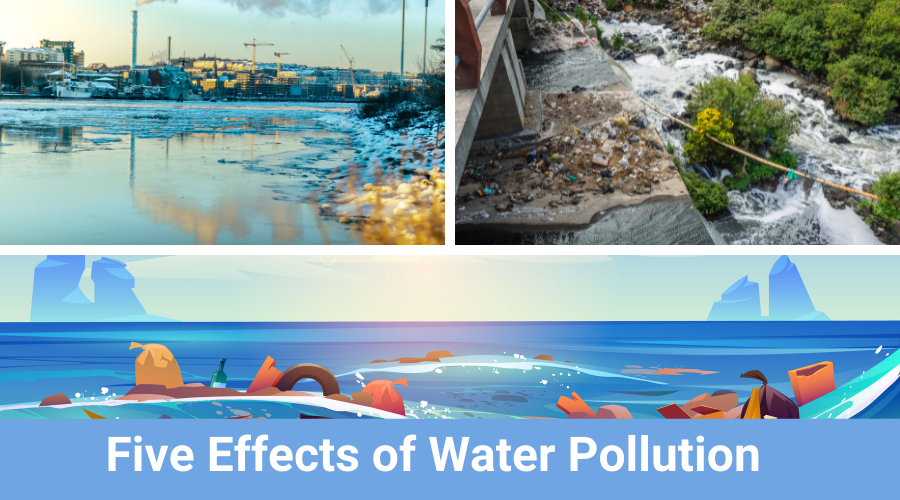As far as I could recollect my childhood school lessons – one of the crucial lessons etched on my mind is about the magic of water. They stated that water is life, and they were correct. Water is an element as vital as air to survive on Earth. 70% of the Earth comprises water thus, being undeniably the greatest resource. I am sure; each one of us has learned ways to conserve water, as it is used in almost every vital chore and process.
But in the last few decades, we humans have done much harm to the Earth to pollute it to its core. Especially talking about water, if you keenly observe all our water resources today, you would be astonished. Water bodies are now; infested with several wastes ranging from chemical waste to floating plastic bags. All these have contaminated water bodies – thus creating water pollution. The toxic compounds released have a devastating effect on the water.
Do you even vaguely remember to have come across rivers and lakes that are brimming with freshwater? Water pollution has become an appalling problem leading the world on the path of destruction.
The effects of water pollution can be seen on the vegetation and the organisms that survive in these water bodies. Not only does water pollution harm marine life and flora, but it also has devastating impacts on human health. Every day, several people die as a result of ingesting contaminated or polluted water.
Drinking contaminated water kills more people each year than all other forms of violence combined, including war, according to statistics. As per the reports, thousands of children die due to diarrheal sickness and other diseases caused by water pollution in India. These figures are rising at a frightening rate.
As a result, it is essential to keep a watchful eye on your health. Do not ignore any signs and symptoms, consult doctors online in India, share the grievances with them and get the treatments as early as possible.
Sources & Causes of Water Pollution
One of the most vital elements on Earth to sustain life is W-A-T-E-R!!! Unfortunately, it is also the one that is vulnerable to pollution. It is because; Water is a universal solvent that easily dissolves substances. Although; this is a fantastic quality that we always take advantage of in our day-to-day tasks, it is also this quality that causes water to get polluted easily.
Now, there are numerous sources through which the water gets polluted. Each of them creates a huge environmental impact. Untreated sewage, on the other hand; is the leading cause of water pollution in India. Apart from it, the other sources of water pollution are runoff from unregulated units of small-scale industry and the agricultural sector. The current situation is so dire that I am sure there is not a single body of water in India that is unpolluted in any way.
Some crucial causes of water pollution are as below:
Wastewater and Sewage:
Bacteria, harmful chemicals, and pathogens are present in wastewater and sewage produced by each household. These toxic pathogens and bacteria pose serious health issues. Not only does the microorganism in water cause severe diseases but, they also become breeding grounds for organisms that act as carriers. These carriers cause several diseases like Malaria, etc.
Industrial Waste
Industries are a significant source of water pollution. Not all industrial sites follow complete regulations related to waste management systems. Thus, the waste produced by these industries in the form of pollutants and toxic chemicals is dumped into nearby water bodies. It pollutes the freshwater system. The harmful chemicals in the industrial waste make the water unsafe for human consumption.
Agricultural Waste
Pesticides and fertilizers are frequently used by farmers to protect their crops from insects and bacteria. These substances get mixed with the groundwater, thus causing harm to plants, animals, and human beings. On top of it when it rains, these chemicals mix with the rainwater. This chemical-infused rainwater flows into the streams and rivers that filter into the ocean, creating further water pollution.
Oil Leaks and Spills
Remember that old proverb like water and oil. This proverb describes things that do not mix at all. Oil and water, for example, do not mix well or dissolve. Often accidentally, large oil leaks and oil spills in freshwater bodies, thus polluting the water. Generally, these leakages are caused by ships transporting oil or oil drilling operations in the sea.
Effects of Water Pollution on Human Health
Respiratory disease
Most water pollution diseases result in poisoning episodes that affect the digestive system to a large extent. However, other infectious diseases are also caused by water pollution like respiratory infections. The absence of safe drinking water is the primary cause of respiratory diseases caused by water pollution. It can also arise if one is exposed to polluted water. For example, swimming in a pool generally, has contaminated water triggers respiratory infections.
You would be surprised to know that even Asthma, an air-borne disease, can be caused by water pollution. Polluted water has some contaminants that may worsen our respiratory system. Some harmful contaminants present in polluted water are Chlorine, Nitrogen Oxide, and Fluoride.
You may wonder that chlorine is used often as a disinfectant, then how does its presence lead to respiratory infections. Well, this chlorine water may provide protection but, in some cases, may also cause problems to those who have Asthma. The same goes for fluoride as well. In regards to nitrogen oxide, this chemical is used for the production of fertilizers, gets into the groundwater. It also increases the chances of respiratory diseases.
Thus, when you notice any slightest signs and symptoms of respiratory diseases, immediately consult a pulmonologist online, share and discuss your symptoms, and begin the treatment on time.
Cardiovascular disease
Several data show that metals found in drinking water may lead to or aggravate heart diseases. The destructive effects of water pollution on human health may also include cardiovascular disease. Several metals in water like Lead and Arsenic are responsible for cardiovascular diseases caused by water pollution.
Lead is generally present in the public water supply but, its presence beyond the contaminant levels is harmful and may increase blood pressure. Tap water too; at times may contain lead due to old lead-containing plumbing pipes. Arsenic, on the other hand; is generally present in water sourced from the well or as a pollutant from pesticides and also due to soil contamination. This arsenic passes from the soil to the crops and food. Long-term arsenic exposure may be harmful to the heart. Arsenic is a poisonous substance that, if consumed, can cause the walls of the heart’s main pumping chamber to thicken. It eventually results in heart failure.
Avoid such situations in life apart from preserving safe and clean water; if you notice your blood pressure is consistently high for a few days, do not delay to consult a cardiologist online and get the diagnosis and treatment ASAP.
Cancer
Talking about the effect of water pollution on human health, one of the frightening effects caused is Cancer. The association of cancer and water pollution has been going on for decades. Cancer caused by water pollution is mainly due to arsenic. This toxic substance is present in groundwater. People in Indian villages dug up groundwater to drink, for irrigation, etc.
Chronic arsenic poisoning may lead to cancer. However, it depends on several factors such as the dosage, the nutrition levels of the person, how long has it been consumed, and any other genetic predisposition. Arsenic has been associated with a range of cancers, with skin cancer being the most frequent, followed by lung cancer, kidney cancer, and bladder cancer.
Some symptoms of arsenic poisoning are keratosis and pigmentation. Keratosis is a condition in which the skin on the soles of the feet and palms gets rough and stiff. If you have any concerns about the water pollution levels in your area and notice any of these symptoms, consult an oncologist online to get a diagnosis and treatment.
Diarrheal Disease
Diarrhea has taken more lives compared to any other water-borne disease in India. It is primarily a problem for children under the age of five. Water from septic tanks, sewage, etc., is contaminated with human feces. It leads to several diseases caused by contaminated water.
Diarrhea caused by water pollution is one of the most common health problems due to water pollution in India. Abdominal pain, watery feces, dehydration, and, in the worst-case scenario, death are all symptoms of diarrhea. This illness can last several days. It drains salts and water from the body, both are necessary for life. Diarrhea is generally a symptom of an intestinal tract infection.
Time and again, curbs are being carried out to keep a tab on this disease. However, being one of the most prominent ones it may affect anyone. Hence, it is recommended to consult a gastroenterologist online and not ignore this health condition.
Neurological Disorder
A complete spectrum of neurological diseases caused by water pollution is common in the Ganges River. Not only the Ganges but also other rivers in India have high levels of pollution.
Researchers have revealed that heavy metal toxins and neurotoxic chemicals dumped in the rivers are above the permissible limits. These are responsible for various neurological disorders along the riverside. The River Ganga has been polluted for decades due to urbanization, increasing population, and defective sewage treatments. Not only is the Ganges considered the most filthy river in the world, but the Gangetic belt is also considered the most densely populated region across the world.
Being the most vital source of water for millions of people, the repercussions of such contamination are alarming. The toxins or the contaminants in water may lead to several neurological diseases caused by water pollution like seizures, strokes, Parkinson’s disease, etc. For all these kinds of disorders, it becomes inevitable to consult a neurologist online; as soon as possible without ignoring the present health conditions.
Mediflam – Consult Doctor Online in India
Water pollution is an invisible threat to mankind. It is a severe environmental hazard caused by many contaminants. Humans can be affected by entering, washing, or consuming polluted water. According to the UN, approximately one lakh Indians die each year due to diseases caused by contaminated water. The primary cause is a lack of access to safe drinking water.
There are several ways o prevent or limit water pollution, which can be content for my next blog. However, if you or your near and dear ones are experiencing any effects of water pollution, seek online doctor consultation in India. Take the online advantage and do not put your health in the back seat. Consult Doctor Online Now!
Water pollution-related diseases are common in India. Thus, being aware of the nature of these diseases and identifying the symptoms in time is crucial to seeking treatment.
FAQ Regarding Water Pollution Effects on Human Health
What is Water Pollution?
Water pollution is when harmful toxic substances like microorganisms, chemicals, etc., contaminate a lake, river, stream, ocean, or any other water body, degrading its quality and making it toxic for the environment.
What are the consequences of water pollution on human health?
The effects of water pollution on human health are it transmits diseases such as cholera, dysentery, diarrhea, etc. it may also lead to other health issues like neurological disorders, reproductive problems, weakened immune system, etc.
What diseases can be contracted from well water?
Contaminated well water can lead to diseases such as diarrhea, dysentery; it may also cause damage to the nervous system, liver, kidneys, etc.
What steps can we take to reduce water pollution?
All the diseases caused by water pollution can be inhibited – by preventing water pollution. We can stop water pollution by following some basic and simple steps such as; not throwing garbage, dried flowers, etc., in the water body, ensuring farmers shift to organic cultivation – thereby reducing the agricultural waste in water bodies. Monitor industrial waste and encourage industries to avoid dumping untreated waste into bodies of water. Managing soil erosion, controlling urban runoff, etc., all should be followed to prevent water pollution.















